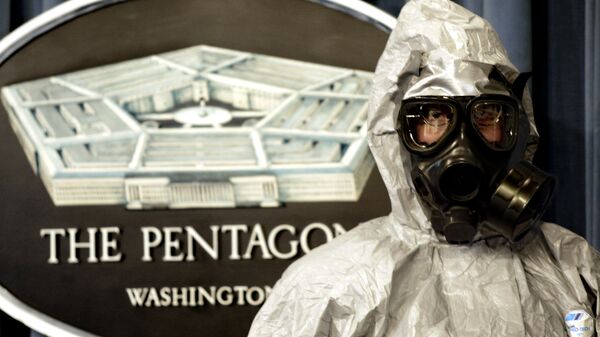The United States military has only limited resources available to assist the federal government’s response to the new coronavirus, chief Pentagon spokesman Jonathan Rath Hoffman has said.
“The Department of Defence is ready, willing and able to support civilian authorities to the greatest extent possible with the direction of the president,” Hoffman said, speaking at a briefing Monday. “We just want to make sure that the conversation that is being had is informed by the facts of what is possible, what is not, and what those trade-offs are.”
Specifically, the spokesman explained that the Department of Defence runs only between 2-3 percent of the hospital bed capacity that private US hospitals do.
Air Force Brig. Gen. Paul Friedrichs, the Joint Chiefs of Staff’ top doctor, who took part in Monday’s briefing alongside Hoffman, warned that the military, which received $686 billion in funding last year, only has access to 36 hospitals, with these largely geared toward combat casualties, not infectious diseases like COVID-19.
“Our doctors are, unsurprisingly, trained highly in traumatic injuries and [for] dealing with traumatic injuries. We have a much younger population that we’re dealing with treating in our hospitals. And so all of these [issues] kind of factor into what is that capability we have for a potential outbreak that generally has been more devastating to older persons who require a different type of attention than we normally do,” Hoffman explained.
Friedrichs added that even the military’s ad-hoc emergency tent hospital response capability is largely geared toward trauma care, not contagious diseases.
Another problem, according to Pentagon officials, is that physicians at the disposal of the National Guard also often combine their work with duties in the private sector. “If you mobilize the Guard and Reserve medical personnel from their civilian jobs, they’re no longer in their civilian jobs, and that direct impacts the community where they worked, and that’s the trade-off that –whether it’s a natural disaster, or the coronavirus or anything else –that’s part of the trade-off that we look at as we offer options going forward,” the Pentagon chief surgeon said.
National Guard activated to combat coronavirus spread in six states, more to followhttps://t.co/PSZNLJC5ay pic.twitter.com/GCDc69gtFt
— ArmyTimes (@ArmyTimes) March 13, 2020
Ultimately, Friedrichs warned that “what we are trying to be very careful about is not overpromising.”
So far, the Pentagon’s COVID-19 response has included calling up over 640 Army and Air National Guard members for duties including support for drive-through testing, assistance for state emergency operations centers, support to the medical community, assistance with cleaning and disinfecting of public places, logistical support, and collecting and delivering samples. So far, this support has been limited to the state level.
The US military, whose numbers include 1.3 million active duty personnel and over 800,000 reserve forces, has reported 37 cases of COVID-19 to date, including 18 military personnel, 13 members of their families, three civilian employees and three military contractors.
Congress Passes Multi-Billion Dollar Coronavirus Response Package
The US House of Representatives unanimously passed a revised coronavirus emergency response bill on Monday, with the multi-billion dollar aid package designed to offer relief to consumers and workers reeling from the damage already caused by the virus. President Trump has declared his wholehearted support for the bill, saying he was looking forward to signing it “ASAP.” The bill allocates $1 billion for testing for uninsured Americans, along with $82 million in additional funding to the Pentagon, and $60 million to the Department of Veterans Affairs, as well as provisions for paid sick leave and unemployment benefits, and targeted food assistance.
Originating in Wuhan, China in late 2019, COVID-19 has spread to 150 countries and territories, infecting over 182,000 people and claiming over 7,150 lives. The World Health Organization classified the situation as a pandemic last week, and the virus has wreaked havoc on the world economy, giving rise to fears of a global recession.

